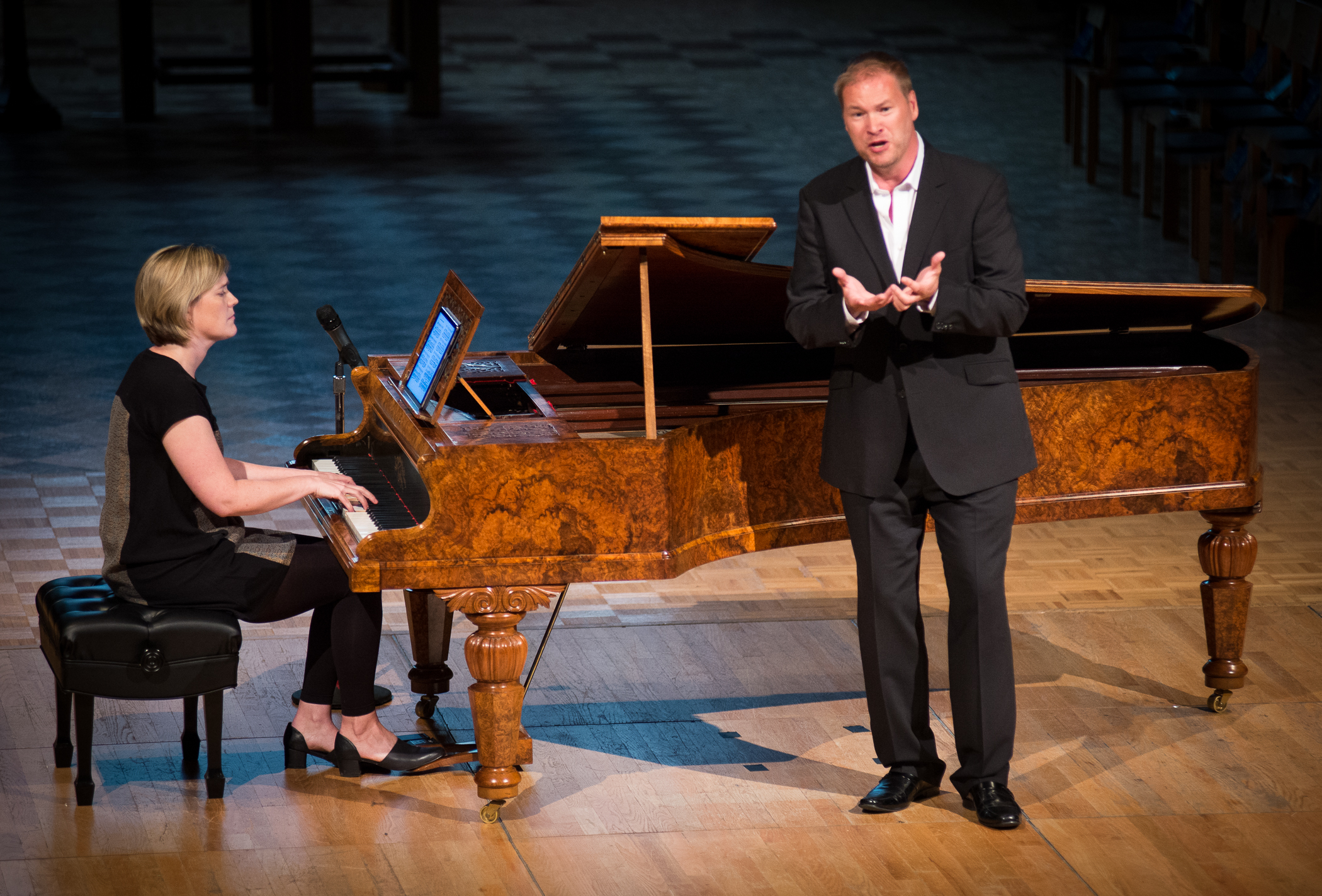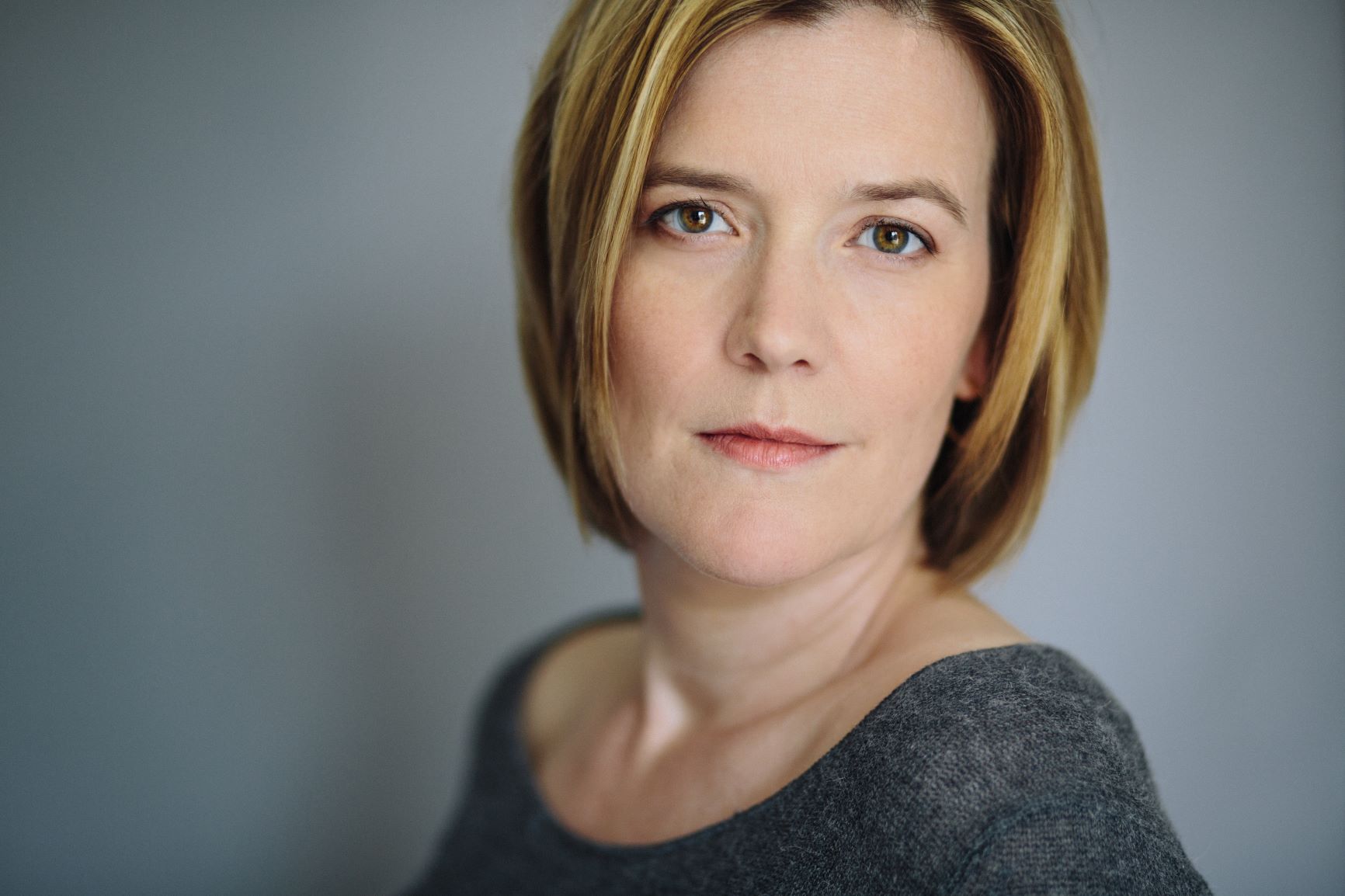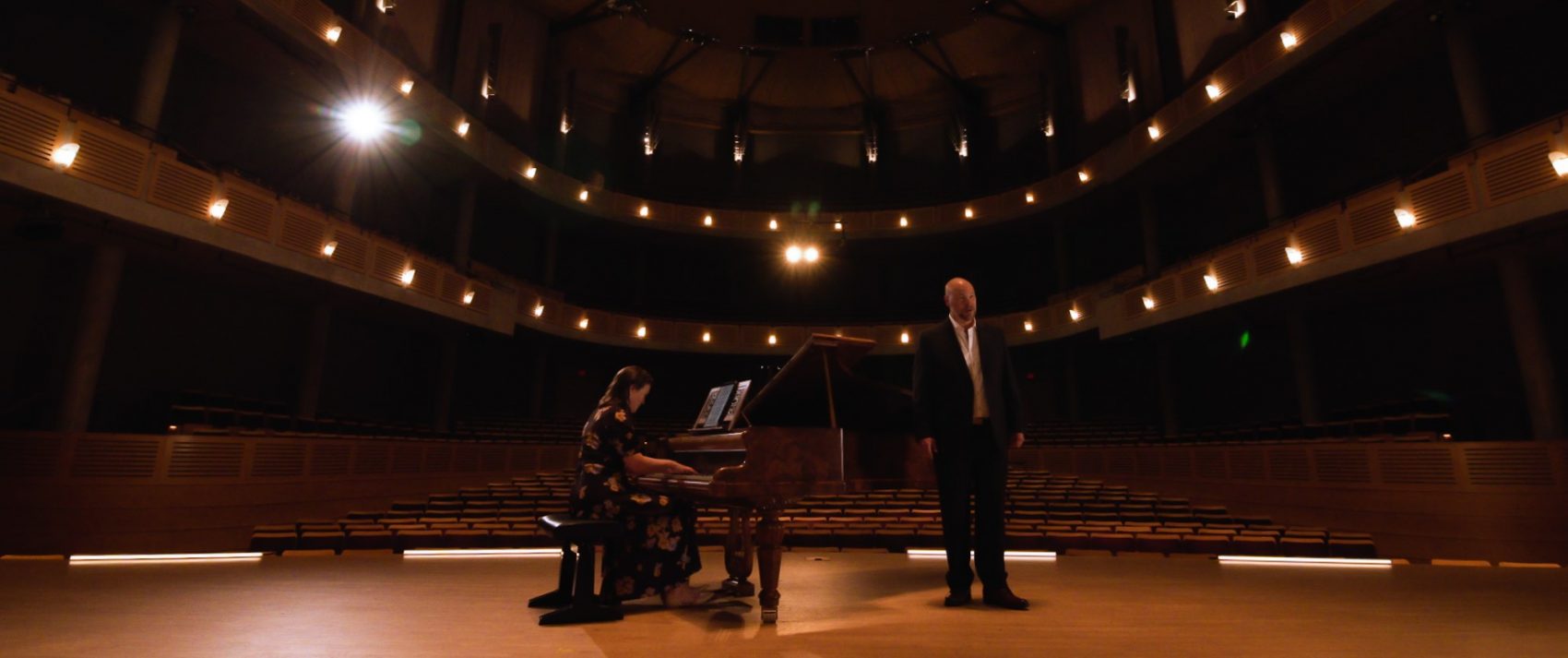Tyler Duncan & Erika Switzer (duo); Tyler Duncan, baritone; Erika Switzer, fortepiano
Love Near, Love Far – a timely and timeless state of longing. Early Music Vancouver recently received an historic and beautifully maintained 1874 Broadwood piano that still possesses its original parts as a gift to the society from Patricia and Nicholas Lee. This instrument has been meticulously restored to sound exactly as it would have 150 years ago and is the perfect vehicle for these late 19th century songs by Ralph Vaughan Williams, Charles Gounod, Cécile Chaminade, and Hugo Wolf.
This concert is generously supported by Jocelyn Pritchard
How to watch:
Online: Watch the concert online by clicking here
This concert is available to watch for free thanks to the generosity of donors. To support our programming by making a tax-deductible donation, click here.
Concert will remain online one year from premiere date.
Programme
Ralph Vaughan Williams (1872-1958)
Robert Louis Stevenson (1850-1894)
Songs of Travel
The Vagabond
Let Beauty Awake
The Roadside Fire
Whither must I wander?
Bright is the ring of words
Maude Valérie White (1855-1937)
W.E. Henley (1849-1903)
Two Songs (1900)
Last Year
The Fifes of June
Charles Gounod (1818-1893)
If thou art sleeping maiden Henry Wadsworth Longfellow (1807-1882)
Beware (1872) Longfellow
Maid of Athens (1872) Lord Byron (1788-1824)
Cécil Chaminade (1857-1944)
Paul-Armand Silvestre (1837-1901)
Fleur jetée (1889)
N’est-ce pas? (1906)
Hugo Wolf (1860-1903)
Eduard Mörike (1804-1875)
Lied eines Verliebten
Bei einer Trauung
Der Jager
Texts & Translations
To read/download the texts and translations, click here.
Programme Notes
1870 to 1910 saw the introduction and flourishing of the imported Liederabend in England. Art Song was no longer an amuse-bouche between larger works in potpourri programs popular at the time.
Coinciding with popular interest in vocal recitals, the modern grand piano was undergoing rapid technical advancements and becoming increasingly capable of showcasing new trends in chromatically infused orchestral-style writing. An 1818 Broadwood 6-octave fortepiano famously inspired Beethoven to new heights in his piano sonatas. By the 1840s, Broadwood & Sons was producing 2500 keyboards a year and had sold a ‘Broadwood square’ to Queen Victoria and Prince Albert for Buckingham Palace. As production shifted away from square keyboards in 1866, “cottage uprights” and ornate straight-strung grands were on the rise. The 1875 piano in this performance is an example of the latter style. Within its beautiful walnut casing, all original parts are intact and have been sensitively restored and maintained over the past 145 years. While its full provenance remains to be uncovered, the piano may have once resided at Balmoral Castle during the reign of Queen Victoria.
This program draws on the excitement of the rising popularity of salon music in the UK. Ralph Vaughan Williams’ timeless Songs of Travel, inspired by the great song cycles of Franz Schubert, saw their premiere at Bechstein Hall (now Wigmore Hall) in London in 1904. It is interesting to note that both the Songs of Travel and Schubert’s Winterreise were written around their 30th year, though Schubert was at the end of his songwriting (and living) years, and Vaughan Williams was just beginning.
Deserving of revival and among the most successful and prolific songwriters of the Victorian Era is Maude Valérie White. Her music fed the imagination of a young Ralph Vaughan Williams, was beloved by Queen Victoria and, now, inspires the listener with a remarkable range of intimacy and boundless enthusiasm. Her Two Songs from the turn of the century showcase her profound gift of melody.
The story of how Charles Gounod came to write more than 60 songs in English is fascinating. Originally escaping the Franco-Prussian War with his family in 1870, he stayed three more years in England, alone and composing many songs, under the roof of a girl’s orphanage run by the amateur soprano and notorious litigant Mrs. Georgina Weldon. Whether amorous or not, the relationship between the two was heated, culminating in Mrs. Weldon’s successful lawsuit against Gounod for 10,000 GBP and a rather infantile return of one of his manuscripts defaced with her name in crayon over every single page. Returning to France, Gounod took the scores he could and recycled some songs with new French translations. If thou art sleeping, Maiden is perhaps now better known as Viens! Les gazons sont verts! and Maid of Athens can also be sung as Vierge d’Athènes.
Cécile Chaminade was an entrepreneuring pianist-composer and a unique voice of the late 19th century in France. She persevered in a discriminatory culture to ultimately succeed both artistically and financially, making a particular mark in the salon culture of North America, where many musical societies in her name still thrive today. The centrepiece of her legacy is a well-known flute concertino, but she reveals her great gift for elegant charm and textures in her songs. Fleur jetée (1889) and N’est-ce pas? (1906) are somewhat unusual for their contemplative moods among her many virtuosic settings. Each, pulsating in supple unfolding phrases, evokes a meditative landscape with longing surges.
Hugo Wolf’s Mörike settings are a cornerstone of the Lied repertoire. They anchor his place in music history and display his profound sensitivity to poetry. Wolf exploits the capacity of the piano to paint emotional and spatial context within Mörike’s imaginative landscapes.
— Notes by Erika Switzer & Tyler Duncan

Tyler Duncan & Erika Switzer (duo)
Baritone Tyler Duncan and pianist Erika Switzer met over 25 years ago in the halls of the University of British Columbia School of Music and ever since have been strong figures in the world of art song, delivering recitals around the world in places such as Germany, England, France, Holland, Italy, Spain, Sweden, South Africa, and across North America. Tyler and Erika share a deep connection to songs of the Romantic period, while also celebrating the works of living composers: they have premiered dozens of new compositions, including by Jocelyn Morlock, Jeffrey Ryan and Andrew Staniland, who have written new works for the duo. Both being born in BC, Erika and Tyler are ambassadors of Canadian Art Song.
As young artists, Tyler and Erika were encouraged to collaborate by legendary soprano Elly Ameling. The pair honed their craft by studying with renowned Lieder performers including Dietrich Fischer Dieskau, Hans Hotter, Rudolf Jansen, Helmut Deutsch, and Brigitte Fassbaender. Erika and Tyler are both accomplished artists on their own; Erika has performed at New York’s Carnegie Hall, the Kennedy Center, the Bard Music Festival, and the Spoleto Festival (Charleston, SC), among many other venues; while Tyler has appeared regularly at the Metropolitan Opera, London’s Wigmore Hall, as well as at the Spoleto Festival and in Bizet’s Carmen under Seiji Ozawa. Both have won numerous prizes and awards, and are prolific teachers: Tyler is on the faculty of Boston’s Longy School of Music, while Erika is on the music faculty at Bard College and the Bard Conservatory of Music.
Erika and Tyler’s first duo album: English Songs à la française will soon be released by Bridge Records, and another album of Canadian Songs evoking the West Coast is on the horizon. The two live with their son in New York’s beautiful Hudson Valley, and are now fortunate dual citizens of Canada and the United States. They are currently halfway through season 3 of Schitt’s Creek, so no spoilers, please!

Tyler Duncan, baritone
Sought-after baritone Tyler Duncan appears regularly on major concert stages around the world. Recent critics have called his performances “eloquent,” “charismatic,” and “stunning,” and praised his “refined, burnished voice” and “impeccable phrasing.” Tyler has recently appeared in concerts with the Minnesota Orchestra, the Toronto Symphony, the Kansas City Symphony, the New York Philharmonic, and at the Wigmore Hall.
Also accomplished on the opera stage, Tyler has appeared at the Metropolitan Opera as Prince Yamadori in Puccini’s Madama Butterfly under Karel Chichon, among many other Met Opera roles. Other recent roles include Morales in Bizet’s Carmen under Seiji Ozawa, and appearances in the Spoleto Festival as the Speaker in Mozart’s The Magic Flute. Duncan is also passionate about new opera; recent roles include Raymond in Nic Gotham’s Nigredo Hotel with City Opera Vancouver, and in the world premiere of Jonathan Berger’s Leonardo at New York’s 92nd Street Y.
Mr. Duncan also performs as a duo with pianist Erika Switzer, celebrating songs from the Romantic period as well as the work of living composers. Together the pair have premiered dozens of new compositions.
Tyler’s recordings include the newly released album English Songs à la française with Erika Switzer, the Juno Award winning Vaughan-Williams Serenade to Music with Peter Ounjian and the Toronto Symphony, Earthquakes and Islands: an album of songs by Andrew Staniland with texts by Robin Richardson, the title role in John Blow’s Venus and Adonis with Boston Early Music Festival, J.S. Bach’s St. John Passion with the Portland Baroque Orchestra, Purcell works and Carissimi’s Jephte with Les Voix Baroque, and a DVD of Handel’s Messiah with Kent Nagano and the Montreal Symphony Orchestra. His singing has been recognized internationally with numerous awards, including Grammy and Juno nominations and prizes from the Naumburg, London’s Wigmore Hall, and Munich’s ARD competitions.
Originally from British Columbia, Canada, Mr. Duncan resides in New York’s beautiful Hudson Valley. www.tylerduncan.ca

Erika Switzer, fortepiano
Canadian collaborative pianist Erika Switzer made her American debut at the Kennedy Center in 2003. Since that time, she has established herself as the frequent partner of several notable vocalists, including baritone Tyler Duncan, tenor Colin Balzer and soprano Martha Guth.
Ms. Switzer has performed recitals at New York’s Frick Collection, Rockefeller University, Alice Tully Hall, Carnegie Hall (Weill Hall), and for the 5 Boroughs Music Festival. In Europe, she has performed as a guest of Pro Musicis at Paris’ Salle Cortot and for the Poulenc Academy at the
L’Hôtel de ville de Tours. Other European performances include appearances at the Göppingen Meisterkonzerte, the New Discoveries series at the Baden-Baden Festspiele, and the Winners & Masters series in Munich. In her native Canada, she has performed at the Chamber Music Festivals of Montreal, Ottawa and Vancouver, and for presenters including Music on Main, Debut Atlantic, Prairie Debut, Roy Thomson Hall Presents: Canadian Voices, and the André Turp Society.
Ms. Switzer has been recorded by the CBC, Dutch Radio (Radio 4), SWR and the Bayerische Rundfunk in Germany, WQXR New York and WGBH Boston. Together with Martha Guth, Erika is co-creator of ͞Sparks & Wiry Cries: The Art Song Magazine,͟ which can be found at www.sparksandwirycries.com. Her recording of Brahms’ Liebeslieder Waltzes, on the Sparks & Wiry Cries label, is available for purchase on iTunes.
Ms. Switzer is on the music faculty at Bard College and the Bard Conservatory of Music. She is a founding faculty member of the Vancouver International Song Institute and co-director of its Contemporary Performance Studies program.
Erika Switzer won First Prize for best pianist at the Wigmore Hall International Song Competition and the Best Pianist award at the Robert Schumann International Vocal Competition. Following seven years in Germany, Ms. Switzer recently completed her doctorate at the Juilliard School of Music.
“Erika Switzer is one of the best collaborative pianists I have ever heard; her sound is deep, her interpretation intelligent, refined, and captivating.” – Le Monde
“… precise and lucid” – New York Times



